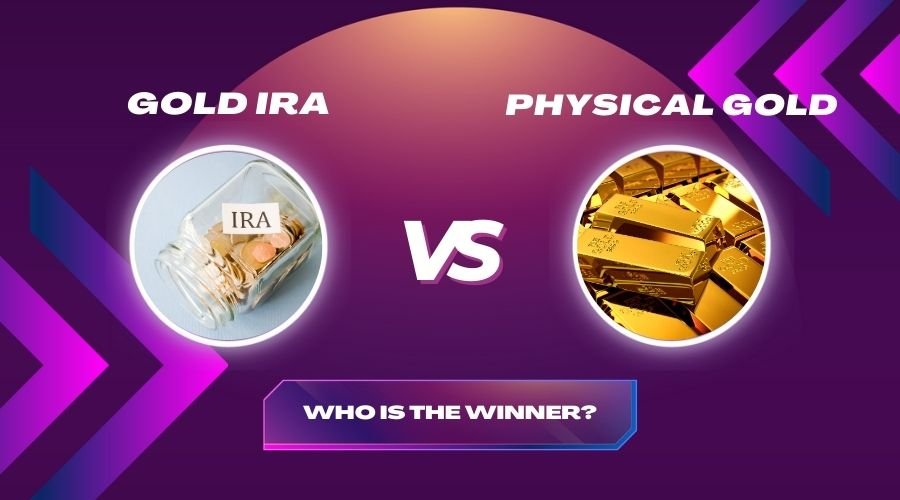Disclaimer: Precious Metals Advice is made possible by our readers. Throughout our posts there are affiliate links to certain companies that we may earn commissions from. The opinions are strictly my own and are not influenced by brands or companies. Please read our Advertising Disclosure for more information.
Before we get to the article about gold IRA vs physical gold, searching for the perfect Gold IRA and Gold Investment company can be a daunting experience.
We have done the research and ranked the top companies based on crucial metrics for your convenience.
<< Click Here To Read The Best Gold & Silver IRA Companies Reviewed in 2024 >>
And if you’re in a rush and you need the facts as soon as possible, here is our top 3 choices along with a detailed review of each.
#1 BEST OVERALL: Goldco
#2 BEST FOR HIGH NET WORTH INDIVIDUALS: Augusta Precious Metals
➡️ August Precious Metals Detailed Review
#3 BEST FOR INVESTMENTS UNDER $5000: Birch Gold Group
Are you looking for an investment that is both secure and profitable? While there are many options on the market, gold remains one of the oldest and most reliable investments.
Not only does it retain its value throughout economic downturns, but it is also a physical commodity that gives investors more control over their assets.
You may be considering investing in gold via a Gold IRA or physically buying coins or bullion; whichever option you choose, we’re here to help you decide.
In this blog post, we’ll examine the differences between these two ways of investing in gold – weighing up the benefits – so that you can make an informed decision about which strategy is right for your current financial objectives.
#1 Readers Choice
Goldco is the leader in the Precious Metals Industry. From Precious Metals IRAs to direct purchases, Goldco has maintained a near perfect track record and therefore is our #1 recommendation for all our readers.

Overview of Gold IRAs

A Gold IRA is a type of Individual Retirement Account (IRA) or self-directed gold IRA account that allows you to invest physical gold, silver, and other precious metals.
While traditional IRAs focus mainly on stocks and bonds, gold IRAs allow investors to diversify their retirement portfolios with hard assets in addition to paper-based investments.
They are a great option for those looking for a long-term investment strategy with the potential for high returns over time.
What Are the Differences Between Self-directed Gold IRAs Vs. Traditional IRAs?

Self-directed Gold IRAs and traditional IRAs serve a similar purpose by investing your money securely, but they each offer different advantages.
With a self-directed Gold IRA, you can diversify your investments with physical gold and silver coins or bars, while traditional IRAs more typically focus on stocks, mutual funds, and bonds.
Self-directed Gold IRAs are also more in the hands of the investor rather than a third party like with a traditional IRA.
This means that you have greater flexibility when it comes to managing your account and making decisions about where to invest without as many restrictions.
#1 Readers Choice
Goldco is the leader in the Precious Metals Industry. From Precious Metals IRAs to direct purchases, Goldco has maintained a near perfect track record and therefore is our #1 recommendation for all our readers.

That said, traditional IRAs come with some significant tax benefits that self-directed Gold IRAs do not offer. Any potential investor should carefully weigh the pros and cons before deciding which type of IRA is best for them.
How Long Does It Take to Open a Gold IRA Account?

Many people have heard of gold IRAs, but they may not be aware of the steps it takes to open one. It is a process that requires some research and careful consideration, as well as an understanding of the legal aspects involved.
It usually takes about a month from initial contact with an investment company or adviser to open the account. The individual must fill out the correct paperwork, review investment options offered by the custodian, and transfer funds.
Working with a reliable source is essential at this point too; finding trustworthy companies who have experience in these types of investments can help everything run smoothly during this process.
People considering a gold IRA must do their due diligence before taking any action to make sure they understand all the details involved in transferring assets or making trades on their accounts.
Pros
- Gold IRA diversifies the portfolio and reduces risk
- Option to purchase physical gold with retirement funds
- Cannot be seized during bankruptcy
- Physical gold is a wise choice for long-term stability
Cons
- Not all types of precious metals can be held within a gold IRA
- Physical gold is subject to storage costs and other fees
- Require a custodian to manage the retirement accounts
- All investments come with an element of risk
Who Should Invest in a Gold IRA?

A Gold IRA is a great way for investors to diversify their portfolios and hedge against potential market risk. Unlike traditional or Roth IRA, Gold IRAs are backed by physical gold, similar to how gold used to be part of the global monetary system.
This type of account also offers insulation from inflationary pressures, currency volatility, and other economic uncertainties.
Investors who have a long-term objective and want to protect their wealth should seriously consider investing in a precious metal IRA. The process is relatively simple and can be managed through an experienced gold broker or custodian.
Moreover, there are various tiers of investments available based on individual preferences, whether it is coins, bars, or mutual funds.
Ultimately, opting for a Gold IRA provides many advantages that could make it an attractive option with greater peace of mind along the way.
Overview of Physical Gold

This strategy entails buying physical coins or bars of gold, which can be stored in a safe or other secure location.
The advantage of this approach lies in the fact that you have full control over your assets and can access them at any time should you need to liquidate them.
It also provides an easy way for investors to diversify their portfolios without having to handle paper investments like stocks and bonds.
Pros
- It’s a tangible asset
- Don’t have to go through a third-party custodian
- It does not depend on the performance of a particular company
- Physical gold is seen as a safe haven asset
Cons
- Investors must pay for storage costs
- Difficult to access in times when you need quick cash
- Doesn’t guarantee returns like stocks or bonds
What are Storage Options for Physical Gold?
For many people, physical gold is an attractive investment option for its stability and potential for long-term gains.
Once you’ve purchased this precious metal asset, it’s important to consider your storage options to ensure the safety and security of your gold.
#1 Readers Choice
Goldco is the leader in the Precious Metals Industry. From Precious Metals IRAs to direct purchases, Goldco has maintained a near perfect track record and therefore is our #1 recommendation for all our readers.

Home safe deposit boxes or counters at any local bank, specialty security companies that store gold offsite, and online custodians are common choices when finding secure places to store physical gold.
Keep in mind that each option has its own advantages and disadvantages – from costs to accessibility – so make sure you choose a spot that works best for your needs.
What Are the Tax Implications of Investing in Gold?

Investing in gold can be an excellent way to diversify one’s portfolio, however, it is important to be aware of the tax implications that come along with investing in this precious metal.
Generally speaking, capital gains taxes will apply when gold is sold at a profit. The rate at which these taxes are applied depends on the gains and holdings periods.
For short-term investments – those held for a year or less – the gains are taxed as income based on the investor’s individual tax bracket. If gold is held for more than a year, then the gains can qualify for lower long-term capital gains rates.
Additionally, if an investor gifts or donates gold away, there may be a gift and estate taxes to take into consideration.
Researching local laws and regulations as it pertains to gold investments should always be taken carefully into account as investors strive to make wise decisions that work best for their financial situation.
Who Should Invest in Physical Gold?

Physical gold is often seen as a long-term investment, suitable for those looking to diversify their portfolios and protect their wealth over time.
It’s also a good option for those who may not have the means or inclination to invest in other assets like stocks or bonds—all they need is enough money to buy the gold they want.
Finally, physical gold can provide an emotional attachment that other investments may lack—it has been used as currency for centuries and holds a certain cultural significance that paper investments do not.
In conclusion, investing in a Gold IRA or physical gold is an effective way to diversify your portfolio and hedge against market risk.
Each approach has its own set of advantages and drawbacks; however, with proper research and due diligence, you should be able to find the right option for your financial goals.
Comparing Gold IRA Vs Physical Gold

When making a decision between investing in a Gold IRA or physically buying gold, it is important to consider both the short-term and long-term financial goals you have set for yourself.
A Gold IRA may provide more flexibility and liquidity in the short term since you can withdraw funds from it at any time.
However, if you are looking for a longer-term investment strategy – one with the potential to provide higher returns over time – then buying physical gold may be the better option.
#1 Readers Choice
Goldco is the leader in the Precious Metals Industry. From Precious Metals IRAs to direct purchases, Goldco has maintained a near perfect track record and therefore is our #1 recommendation for all our readers.

With physical gold, you avoid the fees associated with a Gold IRA and have full control over your assets.
Ultimately, deciding between investing in a Gold IRA or physically buying coins or bars of gold is up to you and the financial goals that you set for yourself.
Both strategies offer advantages and disadvantages depending on how much risk tolerance and flexibility you need in your portfolio. Consider each option carefully before making your decision so that you make an informed choice about which strategy is right for you.
FAQs About Gold IRA and Physical Gold Investment Portfolio
Investing in precious metals such as gold and silver within your Gold IRA can provide stability and security to your retirement savings.
To begin, you should first consult with a financial advisor in order to confirm that the purchase of these assets is right for your personal situation.
Then, you’ll need to research the many precious metals companies available through which to purchase gold or other precious metals.
Precious metals companies specializing in gold sales may offer a variety of different services, from advice on which type of metal to buy based on current price points, to storage solutions for your purchase.
Once you have found a reliable source and determined what types of metal to buy, it’s important to make sure all offers include guaranteed delivery.
Finally, once you have completed a successful transaction, be sure to keep detailed records for future reference for both yourself and your tax adviser.
When buying physical gold, there are several things to keep in mind; not taking them into account could cost you a great deal financially.
First and foremost, potential buyers should be aware of the local laws in their area. Before making a purchase, they should ensure that their area doesn’t place any restrictions on gold ownership.
Secondly, beware of sellers who try to talk you into buying coins or bars with high premiums – these sellers may try to take advantage of your ignorance by gouging you with exaggerated prices.
Finally, gambling on collecting rare coins is not recommended as they can be difficult to sell and won’t give much of a return if you do manage to find another buyer. If you approach purchasing gold with caution and research the market, it can be a profitable long-term investment.
Purchasing physical gold is an attractive asset for anyone seeking to diversify or protect their wealth, but there are rules and regulations that must be followed when making large purchases.
The reporting requirement is something to keep in mind when looking to buy gold; the U.S. government requires that transactions over $10,000 be reported to the Internal Revenue Service (IRS).
But below this threshold of $10,000, you can purchase as much physical gold as you want without needing any sort of documentation.
This is great if you don’t need dozens or hundreds of ounces of gold: simply buy as much as you want without needing to complete reporting forms or worry about being inspected by the IRS.
Physical gold investments are appealing to many investors because they allow you to physically own gold without having to store it yourself.
Typically, physical investments involve buying physical bars or coins which can be held in storage, like a vault, on your behalf without having the physical burden of ownership.
As an investor, you will pay for physical gold an amount ever-so-slightly above the current market price and when it comes time to resell the physical gold, you’re given the going rate at that time minus a fee for handling.
Physical gold offers investors some unique benefits like privacy as no personal details need to be shared during purchase and you don’t depend on any third party when it comes to securely storing your physical gold either.
Investing in physical gold is a great option due to the asset’s physical tangibility and its immune nature from inflation.
With physical gold, you get to hold on to an asset with a universal value that has proven to be a reliable form of investment over the years.
Physical gold also has the potential for a hedge against recession or market uncertainty, which makes it suitable for a long-term commitment without any hesitation.
Depending on your preferences and risk appetite, physical gold is available in coins, bars, or jewelry of different sizes and weights.
It is essential to do your homework before investing in physical gold as there are many options available that offer various price points.
Ultimately, physical gold can provide a great return when done right.
With a Gold IRA, you can become an owner of physical gold. Different types of physical gold available in a Gold IRA include coins, bullion, and bars that are normally made of either palladium, gold, or silver.
You can also obtain approval certification and proofs without owning physical metal to store.
A Gold IRA is the safest way to get exposure to precious metals within your retirement savings portfolio since it is protected by the US government and offers tax advantages.
Owning gold IRAs can be a smart investment choice, but it’s important to understand the costs associated with them. It is best to work with a qualified professional who understands gold IRA’s and what extra charge costs may come along with owning one.
Generally speaking, gold IRA investors face two types of costs – setup fees and storage fees. Setup fees occur only when you first open your gold IRA account, and for gold stored in a depository, there could also be an annual storage fee.
Keep in mind that the more gold you own, the higher your storage costs may be. It is always wise to shop around and consult with experts before investing in gold IRAs to make sure both your financial needs and budget are well catered for.
Withdrawing from gold IRAs is easy when done correctly. Investors can take money out of gold IRA accounts either through a gold IRA rollover or gold IRA withdrawal.
A gold IRA rollover simply transfers the assets to another qualified retirement account, while a gold IRA withdrawal is the equivalent of taking cash out of the account.
There are restrictions on gold IRA withdrawals, according to gold IRA regulations, so investors should make sure to consult with their expert advisors before taking any action.
Withdrawing from gold IRAs cautiously and carefully can help maximize returns while minimizing losses.
Gold IRAs represent a great way to invest in gold and also benefit from important tax advantages. Knowing whether gold IRA fees are tax-deductible is an important part of deciding if gold IRAs are the right investment for you.
Fortunately, gold IRA fees and other gold-related taxes may be deductible up to certain limits, making gold IRAs an even more attractive option for those looking to invest in gold and receive added benefits for their financial situation.
Therefore, researching gold IRA fees and any associated tax benefits is essential for maximizing return on investment when it comes to gold IRAs.
Roth IRAs are a great way to save for retirement, but did you know that Roth IRA funds can be invested in physical gold? It is important to note that it cannot be done directly.
Roth IRAs do not allow the purchase of collectibles like gold coins and bars, due to the complicated taxes associated with such investments.
However, you can use Roth IRA funds to purchase Exchange Traded Funds that invest in gold or other commodities.
ETFs offer many advantages such as diversification within an individual asset class with low transaction costs.
Ultimately, investing in Physical Gold with your Roth IRA can be a great way to diversify your portfolio beyond stocks and bonds while preparing for retirement.












